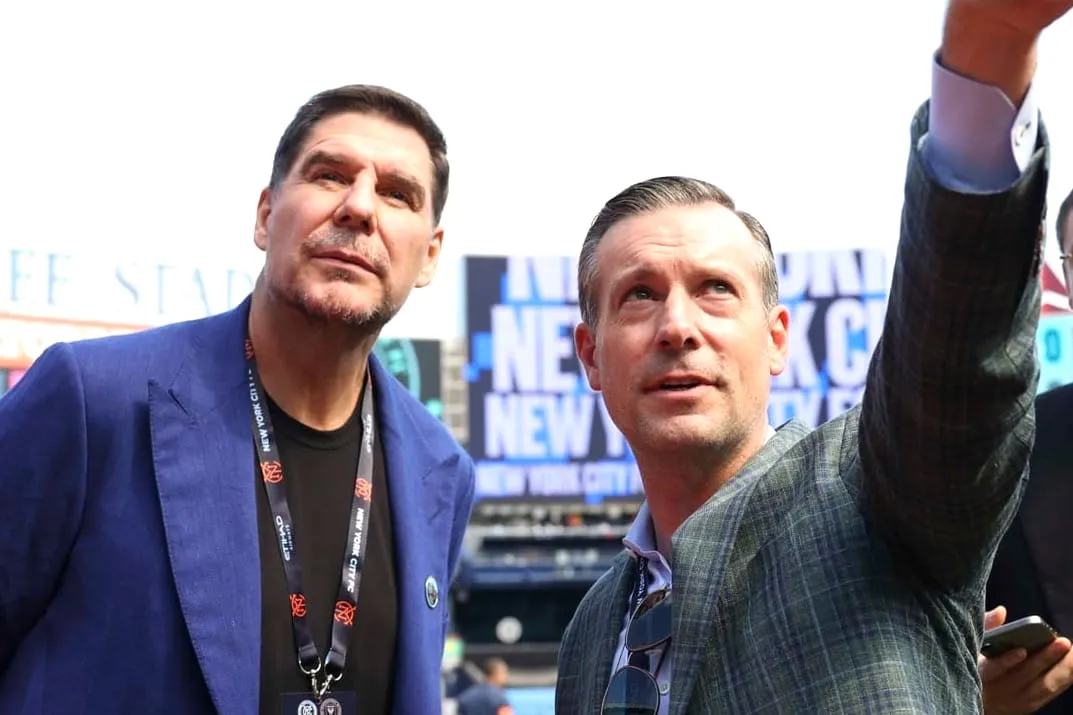Yesterday, members of the media visited the Stadium Experience Center, an immersive exhibit of the yet-to-be-named stadium that New York City FC expect to open at Willets Point in 2027. After the presentation, President and CEO Brad Sims sat down for a roundtable discussion at the club's headquarters in Midtown Manhattan. It was the third time this season that Sims was made available to the media, and while the stadium was the reason for the conversation, he answered questions on a variety of topics.
Note: The statements below were edited for length and clarity.
When will shovels be in the ground for the New York City FC stadium in Willets Point, Queens?
Late September was the target for getting the land lease from the city. Technically, after that happens, you can break ground. So we're still pushing for the end of September for that.
We're still working closely with the city and, hopefully, it will be then or soon thereafter. We're already doing pre-construction work, test piles, and things of that nature, already happening on-site right now. The actual groundbreaking that you will attend will be mostly ceremonial, right? But yeah, we'll be off to the races as soon as that happens. So, hopefully, here in the next few weeks.
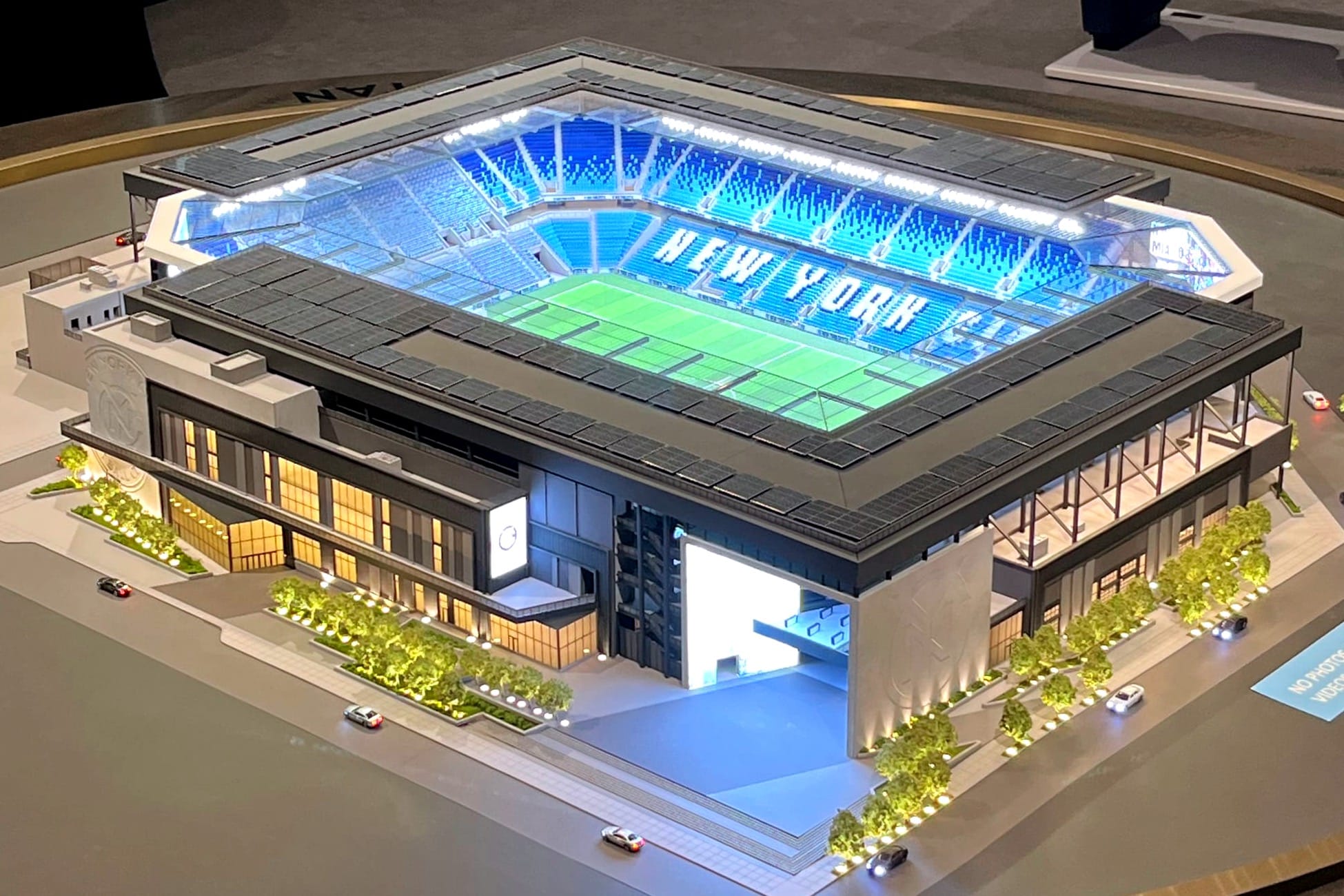
Marcelo Claure: Why the billionaire is good for the team, and the league
Well, first of all, I couldn’t be more thrilled that Marcelo is joining the club [ownership group]. He's been in the family, in the City Football Group family for a number of years, a part owner of Girona, our team in La Liga. He also owns Club Bolivar, he's Bolivian, that's the biggest club in Bolivia, owned that team for quite some time. He brought them into the mix as a City Football Group partner club a few years back. He's also not new to the MLS, a co-founder of Inter Miami.
So he's very passionate. He loves the sport, loves the league, very bullish on the league, loves New York City, has made New York City his permanent residence. And he still travels a lot, but he's here full-time. And he loves the relationships with City Football Group.
So it was really a matter of him coming in and saying, "Hey, I want to be a part of this, you know, I'm going to be living in New York. I love the sport. I love where we're going." Couldn’t be more bullish on this. Like, "How can I get involved in New York City FC?" So that's really how it happened. It wasn't like we went out and hired an investment bank and said, go find us a partner for 10% of the company, which we had zero plans to do.
Why now for him?
Why not now? I don't think there's a more perfect time for someone to get involved with this club, when you think of where the sport is going, where this market's going with the stadium. If he was able to get in, perfect time for him to get in. Then for us, going forward, what does that mean for him? He's going to want to make this thing successful, right?
To comment on the Yankees. So, the Yankees stake isn't technically reduced. They had 20% of the club and 0% of the stadium. Depending on what publications you read, and I won't comment on those, roughly some valuations of the team and some projections of how much the stadium is going to cost are pretty close to the same amount, and so, you know, using rough math, it was–instead of owning 20% of half of the thing, you own 10% of the whole thing. So it's not a dilution from that standpoint, we kind of re-capped and brought in a holding company over the top.
We went from being one company in New York City FC, to now, we have a company New York City FC, we have a company that's the stadium company, and then we have a holding company that's over the top of those two companies. And so the Yankees and Marcelo own both approximately 10% of those, and then City Football Group is approximately 80%.
They [the Yankees] had no share of the stadium, so it's not reducing. We could have just gone through life and not created a holding company and said, I got a team company and stadium company and the Yankees own 20% of this and 0% of that.
There's a lot of challenges with doing that, including where do you classify certain revenues, certain expenses? If you don't have alignment between the two groups, it's suboptimal.
So something like stadium naming rights revenue, which is significant: Does 100% of that goes towards the stadium? Does 80% go towards the stadium? It’s a stadium asset, but if there was no New York City FC playing in the stadium, how much would stadium naming rights be worth?
So there's all these kinds of things where it's much cleaner and much better if you have full alignment and you have this kind of structure. I don't know of any professional sports organization that has a stadium or arena and that is an incorporated company that hasn't kind of done some kind of holding company structure and aligned those things.
Essentially, because the valuations were where they were, 20% of what was the team company vs 10% of what is this holding company are equivalent stakes.
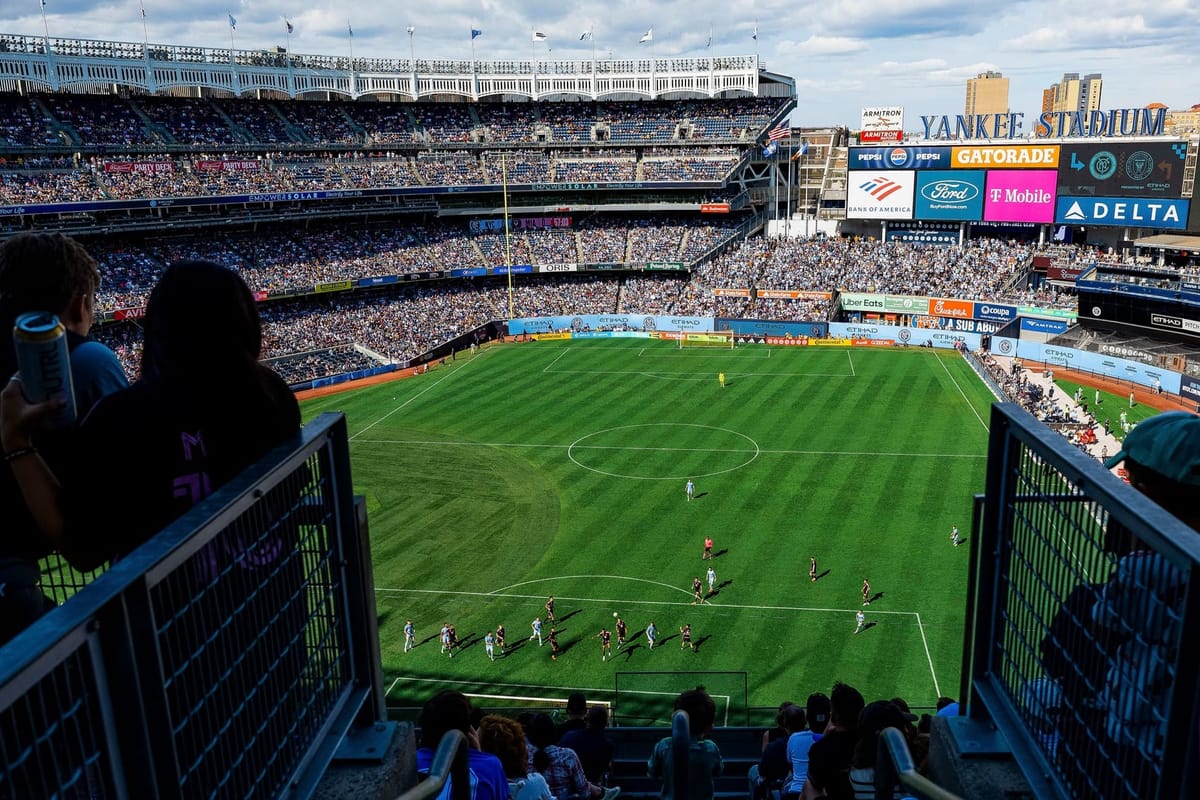
Claure isn't the silent type
He's ambitious. He's wired to be ambitious. He's wired to win, he wants to win on the pitch. He wants to win on the business side, he wants to win off the pitch. I anticipate that he's going to be a great resource for us.
I mean, he brought guests to the game on Saturday and he was already trying to sell them suites for the new stadium, like, right in front of me. I think he's going to be a great resource for us. He obviously has a lot of other business interests. So, remains to be seen, so new, how it's all going to work together. But I'm in pretty regular communication with him, and I would anticipate that we would be going forward, because we want the same thing, we want to grow this thing to be the best that it can be and grow the business to be huge and have a successful stadium opening and win some more trophies. So he's going to be a great addition for us for sure.
I'm making some assumptions based on what I know about him. The successes he's had in everywhere he's been pretty much in his career and his ambition, he wants to win, so I would anticipate he's going to be pushing us on the business side, pushing us on the sporting side, to how can we be better?
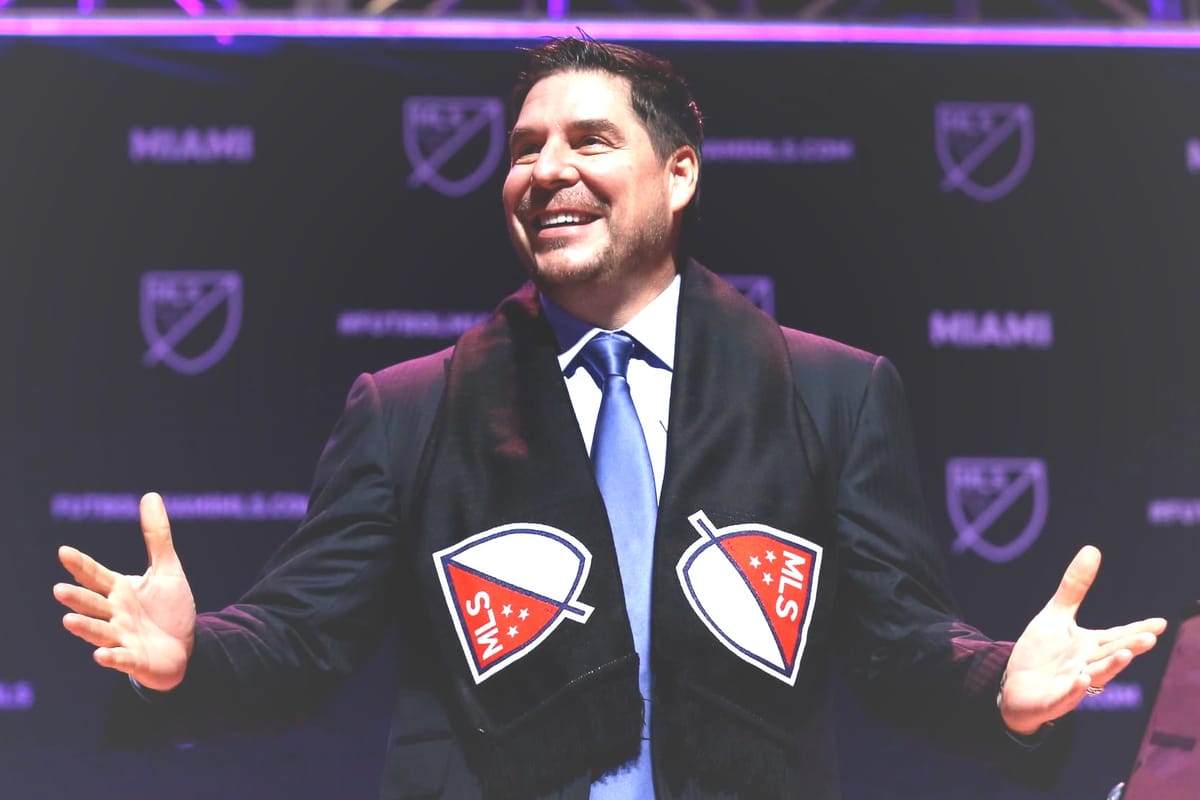
Why the new badge was suddenly announced
We listen to everything that we see from fans. We do social listening exercises when these decisions come out. We hear the feedback, we read the feedback. It's important to get feedback. We care about what our fans think.
It's also important for people to understand that we have a pretty significant fan base. I think that there's definitely a vocal minority on social, and so when people say, "Social is really going to be really brutal." Part of it is, "Let's count out and be like how many people are we really talking about? Are we talking about dozens or hundreds?"
Usually, it's dozens, if that. And, you know, we have 1,800 active Club Founding Member accounts. We have 5,600 active City Member accounts.
We have 400,000 engaged fans, and by engaged fans, I mean people that attend a game, that open and read our emails. Something I love and appreciate about soccer fans, about New York City FC fans, is the passion there, and especially from probably a very core group of Club Founding Members, it’s a very high-level passion and I'm here for it, and I'll listen to everything they have to say.
After the badge, I probably received 15 to 20 emails. I've read every word of every one of them, I responded to every person. Some of them didn't respond to my response, many of them did respond to my response, most of them were favorable and thankful, one or two weren't. That's fine, that’s everyone's prerogative, you know. I don't take it personally. I think that, from our standpoint, we just want to hear and understand what the feedback is. By the way, we had a lot of positive feedback as well. And so, it's important to have a dialogue.
I've seen sports teams – been a part of sports teams – where you could do anything and it's just crickets, it's kind of like apathy. No one really cares. That's terrible, that's a terrible situation to be in. So if we do anything and no one says anything, that's when I'll start worrying. So I appreciate everybody who took the time to write, in some cases, very lengthy e-mails, with some pretty creative wording in some of them. I appreciate that. Could we communicate better and differently? Of course, there's always room to improve on things like that.
The badge thing, I think we have to look through different lenses when we are thinking about the direction of the club, with the overarching one being our charge as a club and as kind of stewards of the club, and I know it's not just me, it's everyone in the club.
Our charge is to grow this thing into a massive club. You guys wouldn’t be in this room right now if you didn't believe that our sport was on this kind of upward trajectory. We wouldn't all be here if we didn't all believe that that’s the direction this thing is going. We at the club need to be able to best position ourselves to capture that, especially in a market like New York. When we make decisions about the club, it's usually first and foremost about, is this going to help us grow the club?
Then we're looking at, we have to look at through the lens of, we have a very committed, very dedicated, very passionate group of fans. It’s almost like the one-percenters of the 1% who are the most vocal of that group, and we care about that. We want to take that feedback. We care about what our less passionate City Members also think. We care about what our general fans are going to think.
We also are trying to be ahead of the curve. We're out there trying to figure out how are we going to best position ourselves to grow fans. You know, the lazy thing that we could do is say, hey, we're building a stadium, we don't have to do anything. You know, just like, “Hey, guys, we got a new stadium. You obviously want to support us now.”
That's lazy and presumptuous. We feel like we have to earn fans. We have to go out there and make it happen. So we have to do things with a level of sensitivity, to our most hardcore fans and also to a level of kind of like honoring and trying to, you know, honor our past also with an eye towards the future.
It’s challenging because I think that certain subsets of fans only look at decisions that are made through one lens, and we have to look at things through multiple lenses. We know that when we do that, we're not going to make everyone happy, because if it's not fully seen through one lens, they're not going to be happy with that. So it's, it's tricky and we have to be sensitive to that.
Actually what you do and then the way you communicate it and actually the process that you go through on the front end are probably three different things, and we can probably be better all three of them because it's always an ongoing challenge with that.
You know, I do feel, even though I think some of these fans disagree, that we did pretty exhaustive work around this, including multiple rounds of focus groups and feedback, not just with supporters, you know, supporters group board members but with Founding Members, non-Founding Members, non-fans, potential future fans, people that raise your hand to being soccer fans, but who are not yet New York City, FC fans.
That's a group that is really important to the club because if you're a soccer fan in New York City and you're not yet supporting New York City, FC, to me, part of my job and a lot of people's jobs in the club is how do we get them to be our soccer fans? So, all these things are kind of vetted out and taken into consideration.
Unexpectedly, there was a leak of a badge that ended up not being the actual badge. It wasn't even one that was considered, but we had, I can't remember, 140 options. When that happened, we got a lot of feedback, and we were upset, but then we're kind of like, “Oh, actually, let's see what people have to say about this."
At that point in time, again, it was pretty split, and there was actually a pretty significant amount of positivity around it. I was asked at that time, we’d rolled out new branding elements at the beginning of the season, we're looking at these things as well, at that point, we'd not made any final decision. We had meetings with Third Rail after that and others on the process, and said that this is a direction we're going, we're kind of maybe between one or two. The last meeting that I was at on the subject was supposed to be about, I think there were 10 people in the meeting, and nine of them were in favor of it, and one of them wasn't. I felt like we had done a good amount of work.
The timing of doing it was because we were opening this thing, essentially the new brand to go with the new stadium. We couldn't open this, have people come through and be like, wait a second, what's that? Also, I don’t want to open the new world with the old world, and so we were up against a timeframe.
We haven't changed over to the new brand on our social handles, we'll do that January 1.
So this was more of a preview, let's get out here, we did a small capsule collection of gear that was well received, and that sold through, and we feel good about that. We're not fully moving until January, but the timing, that was the timing, it got to where we're like, "We have to announce this, and because we were opening this place and we need to start selling some suites." That's the reason behind that. Some people take umbrage with it, and I appreciate their opinions.
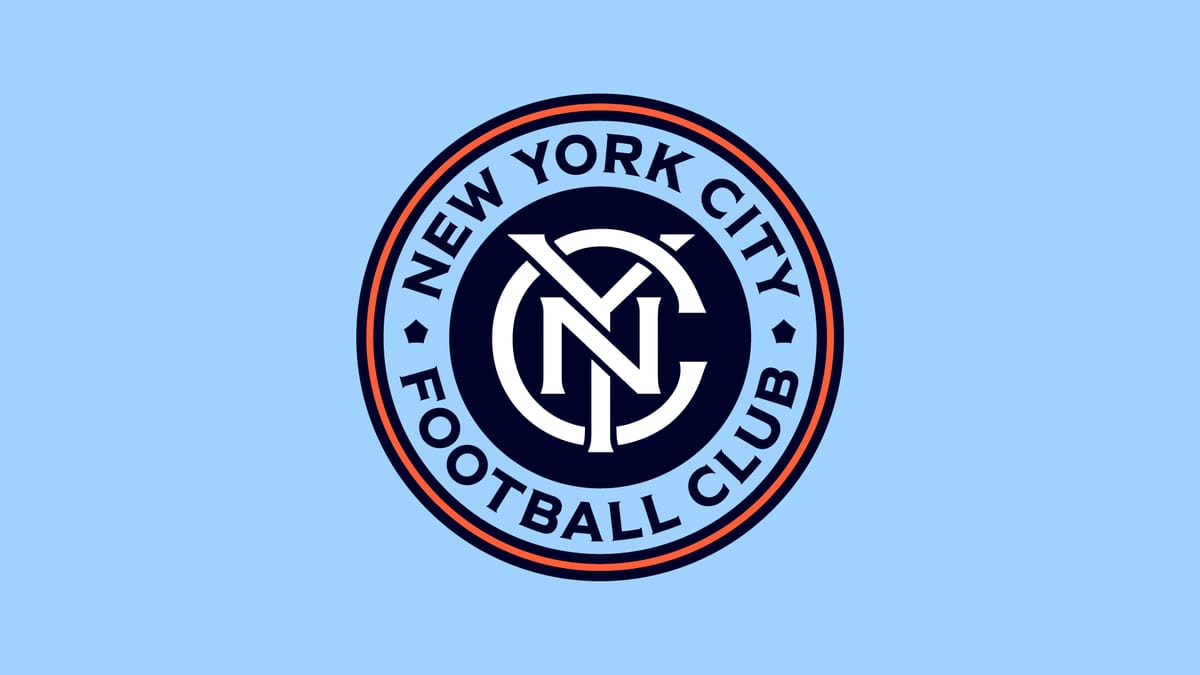
What about those Founding Member bricks?
I won't say “fully been laid out,” but we've been engaging with the supporters' groups on this, and we've had two or three sessions I think so far, feedback, we have identified the place where we are going to kind of commemorate the Founding Members – and we are. The next step is kind of what that's going to look like. We still have two-and-a-half years until the thing opens, up so we have runway to make sure we do this right. And they're going to be involved in kind of every step of the way, but we've identified a spot, we have consensus on kind of the application, on how we're going to do it.
Obviously, I hope our Founding Members stay with us forever. But we'll be kind of rebranding them, as the Founding Members will be Club Founding Members, those who have been with us from the beginning. Once they get through the 2026 season, I won't say their work here is done, but they'll be forever commemorated at the stadium and then our plan is to provide opportunities for other fans to become Stadium Founding Members. We'll have another club, I guess, it will be the Stadium Founding Member group. More to come on that, we're working out what that's going to be. But yeah, if you are a Club Founding Member through 2026, there are no requirements after that, you will forever be known as a Club Founding Member forever and ever, 100 years down the road, and you will always be, more or less, at the stadium.
Could future major games be played at MetLife?
I think it's a great question, but I don't know the answer yet as to what we would do when faced with that situation. It’s interesting. When Miami got Messi, I was shocked that they didn't go to the Miami Dolphins [of the NFL] and just say, "I'm going to play home games there." Shocked, I mean, I couldn't believe it. I absolutely couldn't believe it. And they said, "Hey, we just built this thing. It's a temporary facility and we want to reward the people there."
Obviously there are some different economics and revenue sharing and other things, who knows what kind of deal the Dolphins would have asked for or if they even talked, I don't know the answer to any of that.
But there was something to be said for them about, "Hey, this is our venue. We want to play in it."
I don't know what we would do. I think in the early years, we've been waiting for our home for so long, let’s just stay in our home.
To go to MetLife, okay, big game, let's go to MetLife and play and go to New Jersey…I got enough s**t over the last few years for taking games to New Jersey, you think I'm going to be like, "Okay, let's go to MetLife,” once we have our new stadium? I don't see it, never say never type of situation, but I don’t see it.
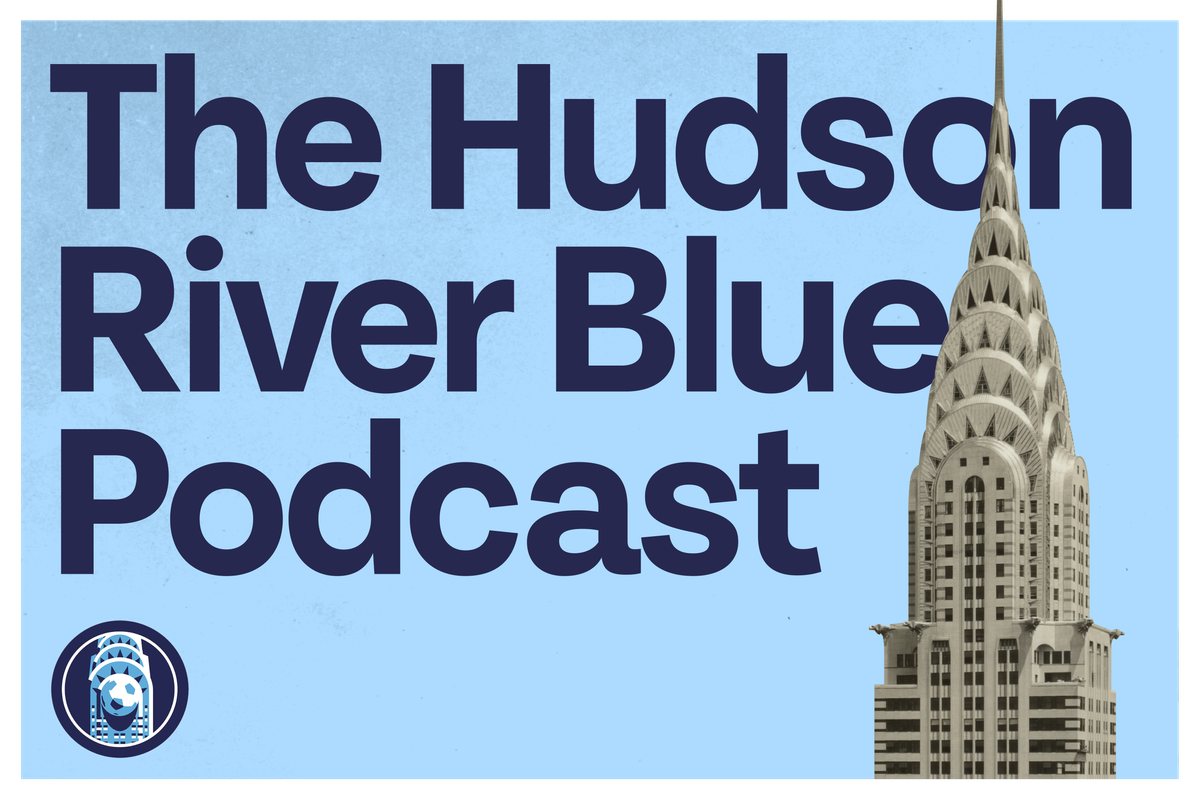
On pricing season tickets, and why Messi & Co doesn't cost more
We know and fans know that every game is not created equal, that every game is not the exact same value. What it used to be, years ago, you’d use round numbers. You have 17 games and your ticket is $100, because I don't feel like doing hard math right now, $1,700 and then you just think that every game is $100.
What we have done the last several seasons for our City Members, essentially we do a lot of data analysis around opponent, day of the week, time of the year, etcetera, etcetera, and we kind of rack and stack all the games in priority order and what we think the highest demand is going to be.
Most of this is a function of where we think we're going to be setting the individual game market for each game. We're going to set the individual game market different for every game when we go on sale. And we always want to be able to give our members the lowest price. And so, you know, going back to the previous, if it was $100 average across, we don't want, you know, there's going to be some games where we might start the individual, you know, the individual game market at $60 or $80. And so, we don't want City Members to be like, wait a second, I'm putting $100 to that seat, and, you know, you guys are charging $60 over here.
Conversely, we know there's also going to be games where we're going to start at $130 or $180 or $250 or in Miami case maybe even higher. And so, what we've done at the beginning of the year, we communicate to members, right, here are your 17 games, and here are the prices of every game, and it’s also venue dependent as well.
We want to say, the Miami game in your package, we're actually, internally, it’s the same package price, didn't change, but internally, we might allocate $375, in the previous example, towards that game, and the game against Cincinnati on October 2nd on Red Bull Arena, we might allocate say $40. It's a massive swing because we know, especially this year and this game, there's a massive swing in what the value is.
We try to educate the members on that so that they see, first and foremost, we want them to understand that we're not trying to undercut them on the games that are lower-demand games.
We're trying to put out fair pricing, market pricing from an individual game standpoint, every game, to the best of our ability. So, having said that, next year we'll do the same thing, and we'll see what games we think are going to be the highest demand, lowest demand. We'll communicate: Here's your per-game allocation. The way we do it, this per-game allocation, also helps with the secondary market and gives them an idea of, okay, this is where the game is at, this price that they need to move, if they want to post tickets on the secondary market. Now they know what to work off of, at most a starting point. That's something that we've done for the last number of years, something we'll continue to do. You know, we do our package pricing well in advance as I think our fans have grown accustomed to. We communicate it in April of every year for the following season.
So, for instance, our pricing for the 2025 season has already been established long, long ago. And our members are already making payments going, you know, most of them on a calendar year basis. Last year, Messi gets announced in July, we know that he's coming the following year. We'd already had our 2024 pricing posted, people were already paying, making their first few payments on their tickets. I know other teams in the league that were in similar situations and they raised prices, and we didn't, so we just said, hey, price is the price, you've been paying it, it stays the same.
Now we knew that the value within that, which for us was actually great, because it allowed us to, from a fan growth standpoint, to be able to have lower price points for a lot of games this year. Essentially we were able to offset that game by going in much lower, much more aggressive, much more fan-friendly to help our fan growth initiatives in other games.
I think one of the reasons even before Saturday's game that we were up almost 10% attendance year over year, a lot of that was that we've been a growing fan base. We're getting more individual game buyers out to games and we've been able to price more competitively from day one than maybe we were in previous years, and the Miami game allowed us to do that because we were able to flex that one way up, which allowed us to flex the other ones. So, you know, we'll see, you know, going into, you know, 2025 again, we've already been out with our 2025 pricing.
There's a small, I mean, say a small pricing increase on average, but, you know, nothing crazy. We're trying to get the upside in revenue for us this year and, you know, hopefully, next year is on single game buyers, group buyers, and especially those that are trying to cherry-pick the best game or games, you know. And if that's what you want to do, then you're going to pay the premium. That makes sense.
On pricing in the new stadium
On new stadium pricing, similar strategy in some ways in the fact that, from a premium hospitality standpoint, why I wish we had even more of that, is because the more premium seating you have and that you're able to sell… the more that you have and more revenue generated from that, it allows the club to be more aggressive on the downside of the reason, really, side with the rest of the building.
We are very sensitive about not pricing fans out, and about giving fans great opportunities. I’ll tell you, the quote-unquote worst seat in the new stadium is going to be so much better than practically the best seat in any of the stadiums we play in right now. The experience is going to be so much better. People are not going to even understand until you get into this Stadium Concept, how ridiculously great it's going to be. We want to be able to have fans have those opportunities and even if it's at the lower price, we want to be reasonably priced, fairly priced.
The way we're able to do that is by selling through premium inventory and being competitive with other venues in the New York area in terms of our premium hospitality offerings. We have to do that from the experience standpoint, too, so a lot of what you saw out there and we showed around kind of the pitch side lounge experience, the “tunnel club,” things of that nature, are designed and meant to meet or exceed similar experiences at stadiums, local stadiums, whether that's MLB, NBA, NHL, NFL, US Open. We feel like that's the competitive set that we're going after from the premium seating, and in the premium hospitality market. So we need to have an experience that meets or exceeds those experiences, which we are confident that we have.
That would then allow us to price competitively with those experiences, which we, I don't know, we're not pricing our suites at what Madison Square Garden prices suites. I think that we are appropriately priced. We have different value propositions.
Suite prices will include food, beer, wine
All of our suite product has food and beverage included. Probably the only building that I'm aware of, definitely in New York and maybe anywhere where every single seat in the West Stand has food and beverage included.
You know, one of the big things you hear about suite product a lot of times and one of the biggest objections you get from CFOs and companies is, they pay a license and they pay this big license fee on the front end then they just get hit with bills every single event because it's like food and beverage food and beverage and just like when they're not budgeting for that and then just, and it's just like kind of the never-ending, you know, bill that just keeps on coming where we can give them price certainty on that. So that's factored into the expense on the front end.
Depending on the areas, beer and wine in most of the areas, and in a couple areas also liquor as well. And food and, you know, and not just food pregame but a different spread coming in half time and even stuff post-game to go.
The food and beverage and by the way, across the entire stadium we want to be a key differentiator.
We've invested a lot of time, effort, energy into that experience. We have more news coming on that actually maybe in the next week or two in terms of some of the food and beverage experience that will be more geared towards the general public. That's something that it's not just for the hospitality customers, it's going to be an incredible food and beverage experience for every one of the 25,000 attendees.
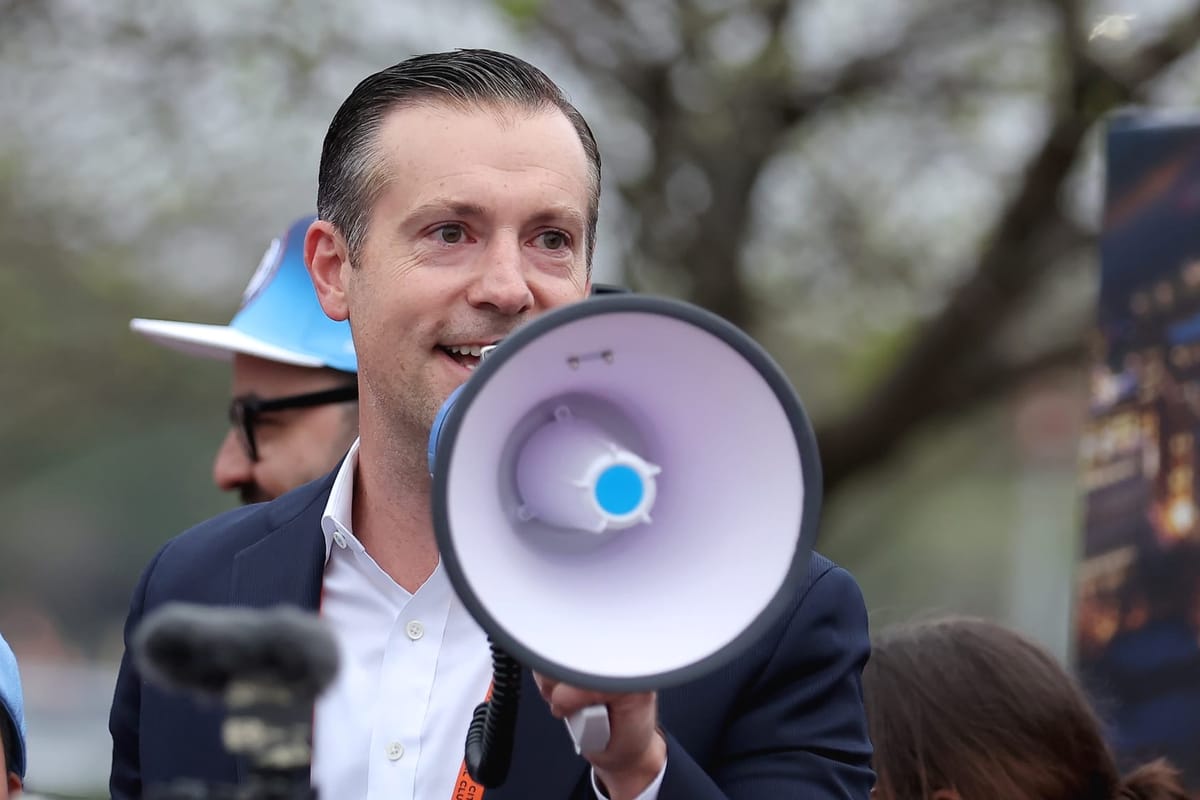
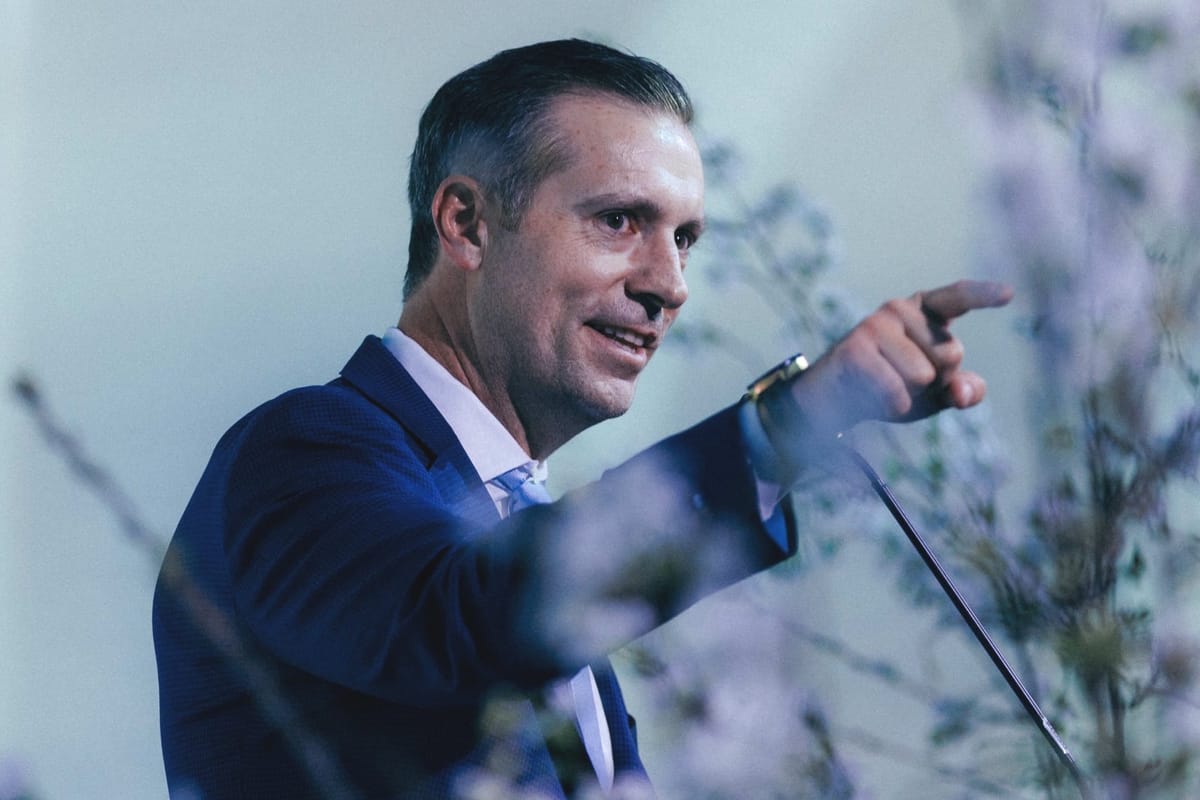
What will MLS do after Messi?
The league is seeing the impact [of Messi]. Everyone in all the clubs, they see the impact. And you see it wherever he goes.
The last handful of Board of Governors meetings that I've attended, that's the topic, it's like, all right, how do we keep going? What does that mean for investment models for the league going forward?
I think that there's also this inflection point for the league and for the sport in 2026 and I think that MLS is not just of the mindset of, all right, we're going to start the 2026 season in February like we always do, and then we'll take a break for the World Cup, and then we'll resume the season after the World Cup, and then we'll just keep on having the 2026 season as is and like, and just keep on going on.
I think that there's an urgency around figuring out: What should we be doing differently, how should we be repositioning the league, the clubs, the player investment model, the competition format, everything is on the table in terms of what should this look like. No one wants to just be like, let's start a season, have a break for the World Cup and then finish the season.
I think that we’ve got to have something different, something more exciting, something that they can capitalize on immediately, not wait until the following year, though, you know, we're going to wait for the stadium to open.
I would anticipate that between now and the World Cup, the rules that are in place now, the league that we have now, won’t be exactly the same, coming out of 2026, going into 2027. I can't see it, honestly,
There's enough momentum and enough focus on it, we have to take advantage of it as a league. I don't know what that means exactly yet, there are a lot of things under consideration, but it's going to be different, it's going to be different, and because there's an appetite, broadly across all the ownership, there's no pushback, there's no group of owners like, “No guys, let's just keep everything the way it is, let's not do more.”
The owners are like, let's push all the chips into the middle of the table, World Cup, and it's just the matter of what does that mean, what does that look like, and that's what I think the league and the owners are working on, trying to figure out.
To me, it's going to be exciting for the league, and I don't know exactly what that's going to mean for us, but I think it's going to be positive for sure.

